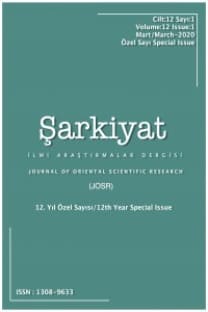THE CHANGING STRUCTURE OF THE TRIBE IN THE PROCESS OF URBANIZATION
Tribe, City, Urbanization, Modernization, Changing
THE CHANGING STRUCTURE OF THE TRIBE IN THE PROCESS OF URBANIZATION
Tribe, City, Urbanization, Modernization, Changing,
___
- Aytaç, Ömer. “Kentleşme ve Normatif Çöküş: Enformelleşme ve İllegaliteye Kayışın Toplumsal Temeli”. Birey ve Toplum Sosyal Bilimler Dergisi 8/1 (2018), 5-29.
- Aytaç, Ömer. “Kentin ve Kentsel Yaşamın Patolojisi”. Şehir ve Medeniyet Dergisi 6/12 (2020), 11-36.
- Barth, Frendrik. Kürdistan’da Toplumsal Örgütlenmenin İlkeleri. çev. S.R. Şengül, H. Özsoy. İstanbul: Avesta Yayınları, 2001.
- Bauman, Zygmunt. Sosyolojik Düşünmek. çev. Abdullah Yılmaz. İstanbul: Ayrıntı Yayınları, 2016.
- Beşikçi, İsmail. Doğuda Değişim ve Yapısal Sorunlar (Göçebe Alikan Aşireti). Ankara: Yurt Kitap Yayın, 1992.
- Bruinessen, Martin van. Kürtlük, Türklük, Alevilik. çev. H. Yurdakul. İstanbul: İletişim Yayınları, 1999.
- Bruinessen, Martin van. Ağa, Şeyh ve Devlet. çev. B. Yalkut. İstanbul: İletişim Yayınları, 2011.
- Bruinessen, Martin van. “Kürt aşiretleri, Etnik Kimlik ve Orta Doğu’da Devlet”. Çev. B.Yoldaş. Türkiye’de Aşiret Tartışmaları. Ed. Suvat Parin. 26-48. İstanbul: Bağlam Yayınları, 2019.
- Eppel, Michael. “The Kurdish emirates: Obstacles or precursors to Kurdish nationalism?”. Routledge Handbook on the Kurds. Ed. Micheal M. Gunter. New York: Routledge, 2019.
- Esgin Ali. “Aşina Olunanın Bilinmezliği: Kentin ve Kentsel Gündelik Hayatın Sosyolojisi Üzerine”. Toplumsal Analizler Ekseninde Kent Fragmanları. Ed. Özgür Sarı, Ali Esgin. 17-60. Ankara: Phoenix Yayınevi, 2016.
- Frisby, David. Modernlik Fragmanları: Simmel, Kracauer ve Benjamin’in Eserlerinde Modernlik Teorileri. çev. Akın Terzi. İstanbul: Metis Yayınları, 2012.
- Giddens, Anthony. Sosyoloji. çev. İsmail Yılmaz. İstanbul: Kırmızı Yayınları, 2012.
- Gökalp, Ziya. Kürt Aşiretleri Hakkında Sosyolojik Tetkikler. sad.Y. Toker. İstanbul: Toker Yayınları, 2007.
- Güngör Ergan, Nevin. (2020). “Türkiye’nin Toplumsal Yapı Temelleri”. Türkiye’nin Toplumsal Yapısı. Ed. N. G. Ergan. 41-48. Ankara: Siyasal Kitabevi, 2020.
- Haviland, William. vd. Kültürel Antropoloji. çev. İnan Deniz, Erguvan Sarıoğlu, İstanbul: Kaknüs Yayınları, 2002.
- Heckmann, Leyla Yalçın. Kürtlerde Aşiret ve Akrabalık İlişkileri. çev. G. Erkaya. İstanbul: İletişim Yayınları, 2006.
- İbni Haldun. Mukaddime I-II. çev. H. Kendir. İstanbul: Yenişafak Gazetesi Yayınları, 2004.
- Jabar, Faleh A. “Şeyhler ve İdeologlar: Aşiretlerin Irak’taki Baba Tarafından Kalma Totalitercilik Altında Yapı Bozumuna Uğraması ve Yeniden Yapılanması, 1968-1998”. çev. Ö. Evinç. Aşiretlet ve İktidar: Orta Doğu’da Etnisite ve Milliyetçilik. Ed. Faleh Jaber, Hosham Dawod. 65-108. İstanbul: İstanbul Bilgi Üniversitesi Yayınlar, 2013.
- Karadeniz, Sıtkı. Aşiret Sisteminde Dönüşüm-Aşiretin Kentte Aldığı Yeni Şekiller: Batman Örneği. Malatya: İnönü Üniversitesi, Sosyal Bilimler Enstitüsü, Doktora Tezi, 2012.
- Kurtuluş, Hatice. “Kent Sosyolojisinde Değişen Kavrayışlar ve Türkiye’nin Kentleşme Deneyimi”. Türkiye Perspektifinde Kent Sosyolojisi Çalışmaları. Ed. Ö. A Uğurlu. 177-227. İstanbul: Örgün Yayınevi, 2010.
- Maisel, Sebastian. The Kurds An Encyclopedia of Life, Culture, and Society, California: ABC-CLIO, 2018.
- Millingen Major Frederick. Kürtler Arasında Doğal Yaşam. çev. N. Mestçi, İstanbul: Doz Yayınları, 1998.
- Mutlu, Ahmet. Kenti Anlamak, Kent Kültürü Sorunu ve Politikası. Ankara: Palme Yayınevi, 2020.
- Özden, K. ve Salur, Ş. “Kimlik Bunalımı ve Yabancılaşma: Modern Kentleşmenin Sosyo Kültürel Bir Sorunu”. Kentleşme Yazıları; Kentsel Kuramlar ve Kentleşme Politikaları. Ed. Kemal Özden. Ankara: Seçkin Yayıncılık, 2014.
- Parin, Suvat. (2019). “Aşiret ve Ağalığın Kent Formları Üzerine Bir Araştırma: Van Kent Merkezi Örneği”. Türkiye’de Aşiret Tartışmaları. Ed. Süvat Parin. 82-96. İstanbul: Bağlam Yayınları, 2019.
- Simmel, Georg. Modern Kültürde Çatışma. çev.T. Bora, U.Özmakas, N. Kalaycı ve E. Gen. İstanbul: İletişim Yayınları, 2015.
- Şengül, T. ve Ersoy, M. (2000). Kentsel Yoksulluk ve Geçinme Stratejileri Ankara Örneği. Ankara: ODTÜ Yayınları, 2000.
- Tapper, Richard. İran’ın Sınır Boylarında Göçebeler: Şahsevenlerin Toplumsal ve Politik Tarihi. çev. F D. Özdemir. Ankara: İmge Kitabevi Yayınları, 2004.
- Tatlıdil, Ercan. “Kentleşme ve Göç”. Sosyolojiye Giriş. Ed. İ.Sezal. 326-361. Ankara: Martı Kitap ve Yayınevi, 2003
- Uluç, A. Vahap. “Kürtler’de Sosyal Ve Siyasal Örgütlenme: Aşiret”. Mukaddime Dergisi 2/2 (2010). 35-52.
- Uluç, A.Vahap. Bir Aşiret Monografisi: Tarih, Toplum, Siyaset. Ankara: Gazi Kitabevi, 2020.
- Başlangıç: 2009
- Yayıncı: Şarkiyat Araştırmaları Derneği
THE CHANGING STRUCTURE OF THE TRIBE IN THE PROCESS OF URBANIZATION
HACÎ QADIRÊ KOYÎ: DAMEZIRÎNERÊ KANONA NETEWEYÎ YA KURDÎ
İMAM ZÜFER’İN USÛL DÜŞÜNCESİNE BİR EK: TE’SÎSÜ’N-NAZAR’DA ZİKREDİLEN ASIL’LARINA ZİYADE
Ünal ŞAHİN, Abdurrahman HAÇKALI
ŞÎA’DA İSMET İNANCI VE ŞİÎ TEFSİRLERDE PEYGAMBERLERİN MÂSUMİYETİ
KUR'ÂN'A GÖRE AKIL ve TEFSİRDEKİ ROLÜ BAKIMINDAN AKLIN KUR'ÂN'A ARZI
GÜNDELİK HAYAT VE FAİLLİK PROBLEMİ
EL-ARABİYYE Lİ’L-HAYÂT İSİMLİ KİTAPTA YER ALAN EŞDİZİM UYGULAMALARININ ARAPÇA ÖĞRETİMİNE KATKISI
DEDE KORKUT HİKÂYELERİNDE KÜLTÜREL BELLEĞİN TAŞIYICI ÖGESİ OLARAK RENKLER VE SAYILAR
KUR'ÂN'A GÖRE AKIL ve TEFSİRDEKİ ROLÜ BAKIMINDAN AKLIN KUR'ÂN'A ARZI
ALLAH’IN İSİMLERİNİN TEVKÎFÎLİĞİ VE KEMALPAŞAZÂDE’NİN TARTIŞMADAKİ KONUMU
